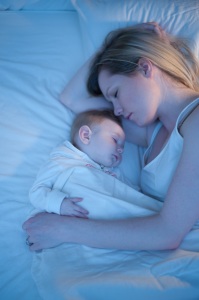
The following is a screening tool only. This means it’s purpose is to look at common behaviours and see if they fit with certain outcomes that can explain sleep troubles in young children. It does not diagnose any specific problem. It also is more likely to find problems when there are none (false positives) than miss problems because the goal of screening tools is to catch as many problems as possible. It is to be used as a tool to help you know what – if anything – to do next with respect to your child’s sleep.
Welcome to Evolutionary Parenting’s Brief Infant and Toddler Sleep Screening, otherwise known as BITSS. This screening was developed as a response to what I saw as a growing need for families to access some quick information about their young child’s sleep. Sleep is one of the most common worries for families and results in a lot of stress for everyone involved and my hope here is to start a family’s path towards happiness with sleep. Many families worry something is wrong when really their child is quite normal. Others think sleep is the problem when in reality it may be a health or feeding issue. And sometimes we just do things as parents that can have a negative impact on our child’s ability to reach their sleep potential (which is highly variable and dependent on development).
This screening is short and should take less than 5 minutes to complete. As it is a brief screening, it is not conclusive and to be used only as a guiding force for what you may want to look into next, if anything. In some cases, you may be told there is the potential for a problem and really there isn’t (which is lovely!), and this happens because you have endorsed items that are frequently associated with a certain area. Currently it is set for children up to 3 years of age, but may be relevant for some slightly older – you can try it out if you like! It is definitely not relevant for children ages 6 and above.
When you receive your results, you will also be guided towards some general recommendations about who you can follow up with or any recommended readings. I hope you find this helpful and I welcome any feedback on the test itself which you can send via email to: tracy@evolutionaryparenting.com and please put “BITSS” in the subject line.
Pour le prendre en Français, cliquez ici.
For the following questions, please think about the last 3 months only:
